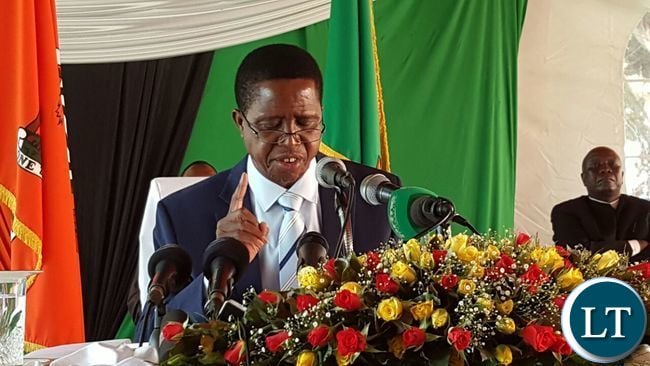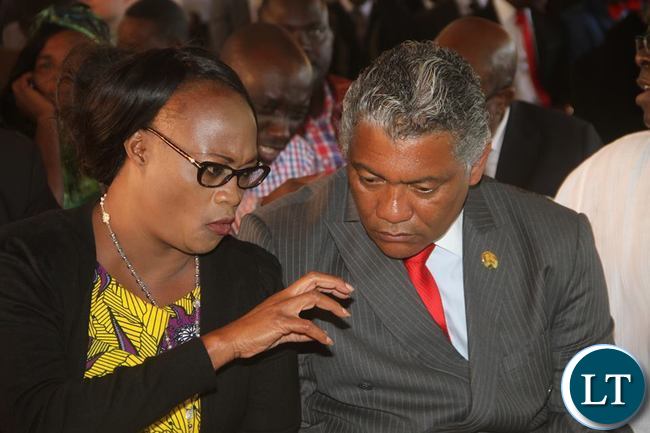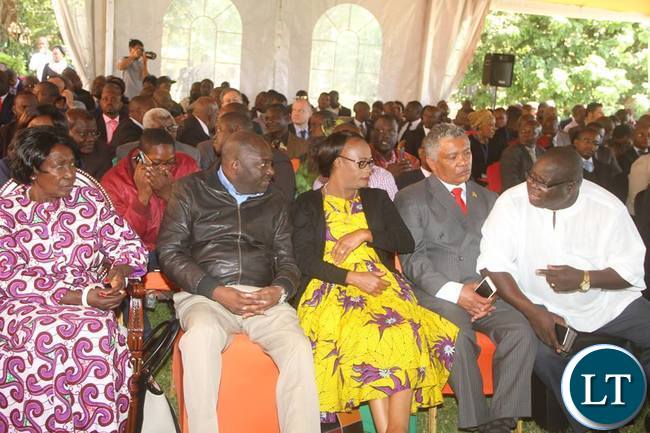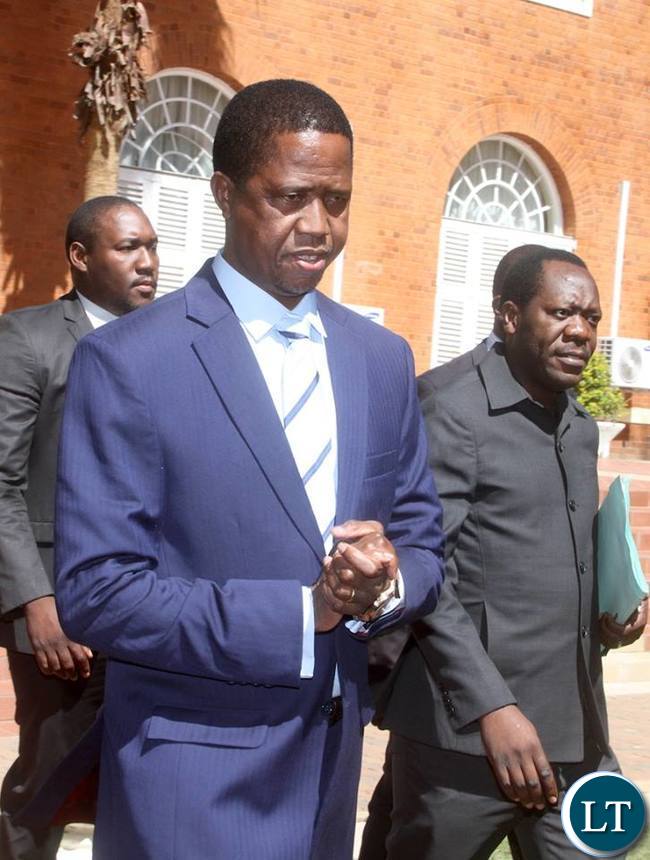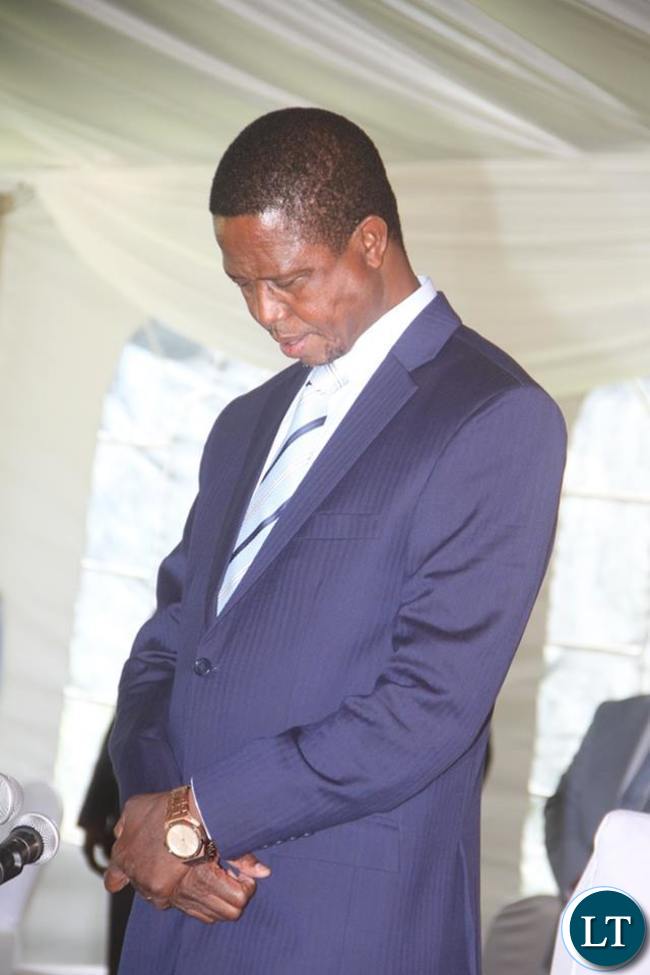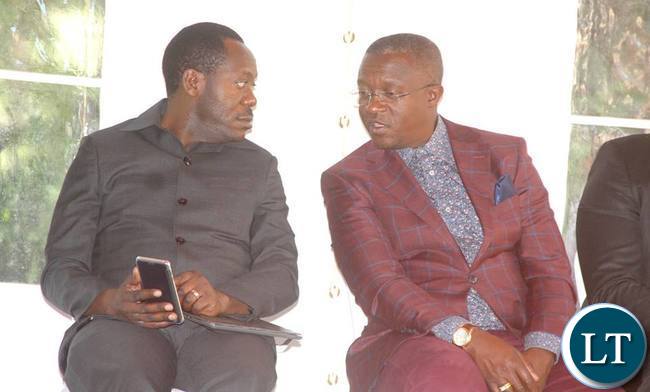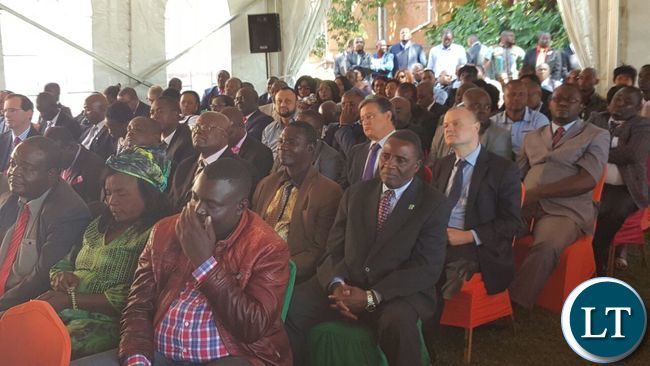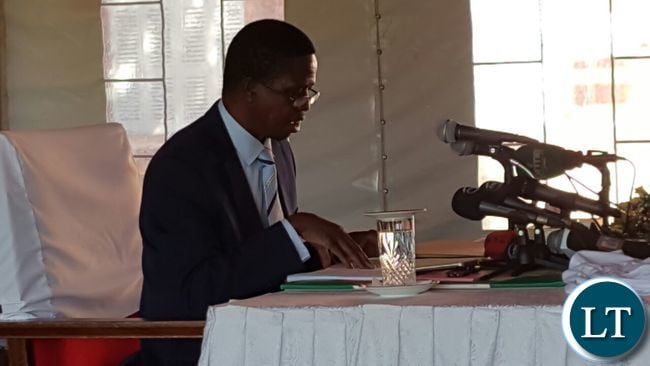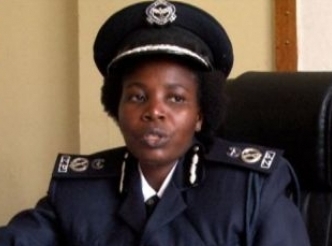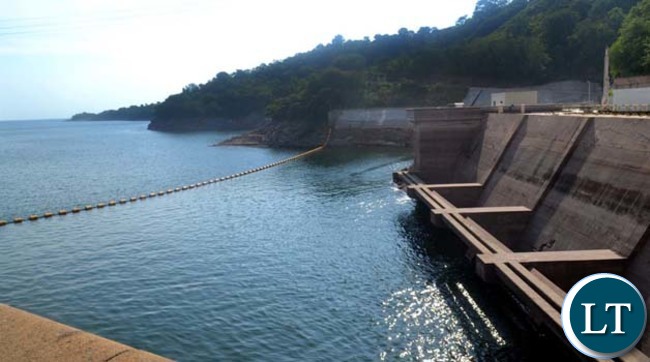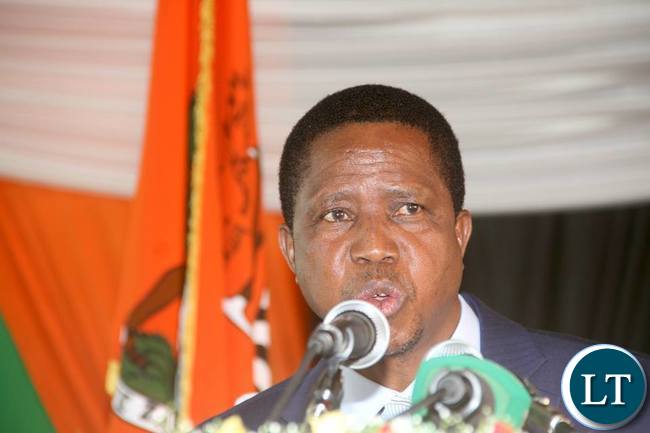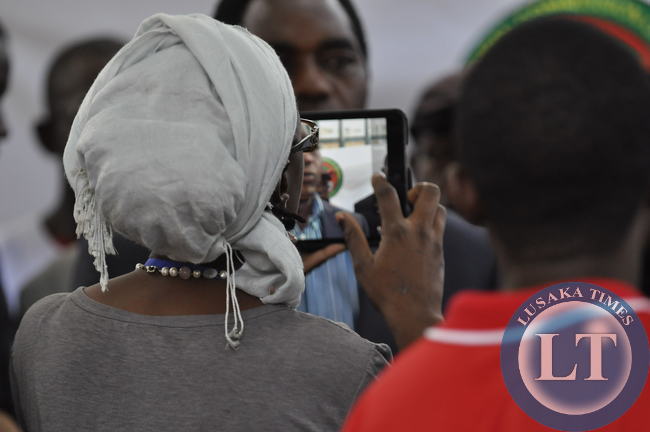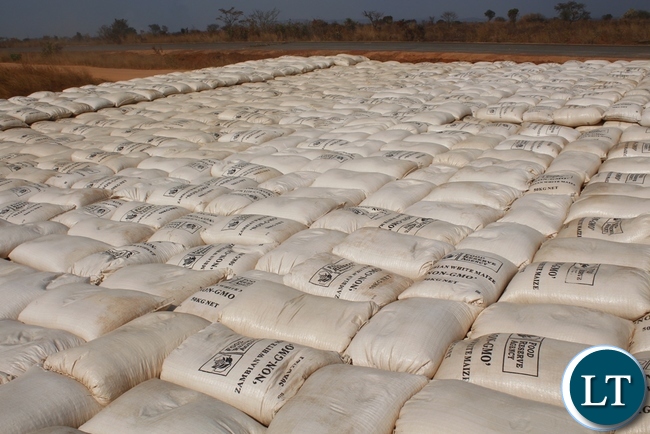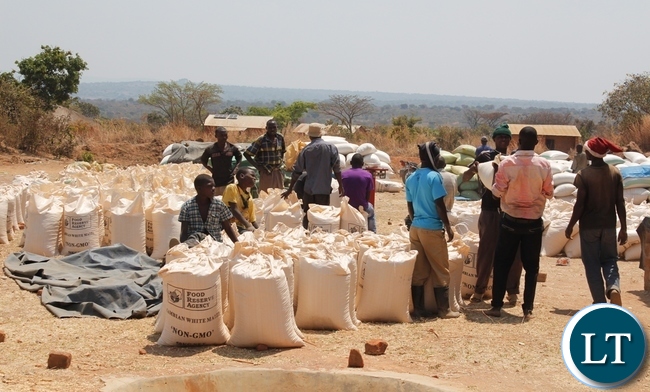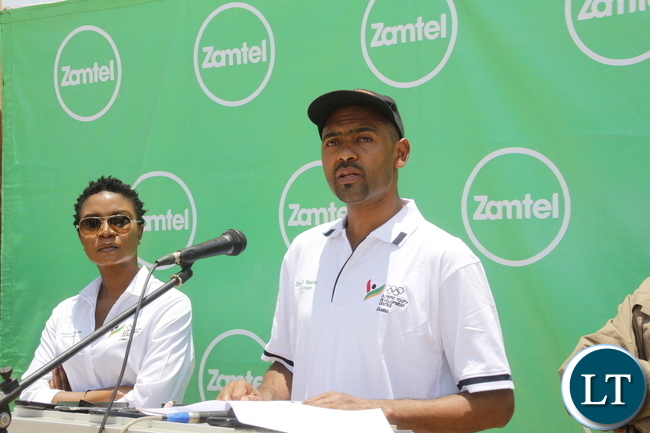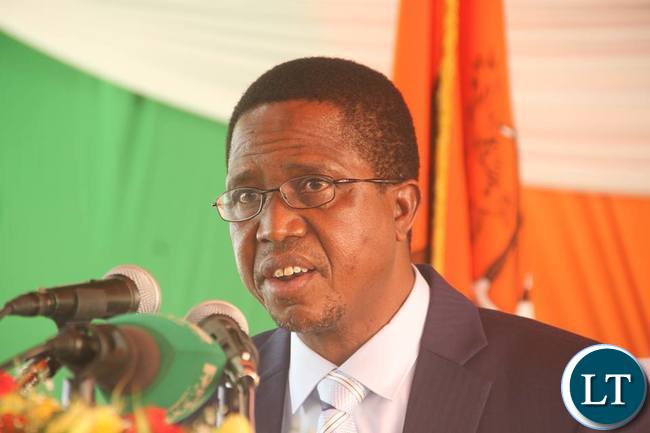
Your Honour the Vice President of the Republic of Zambia, The Party Secretary General and Members of the Central Committee, The Honourable Speaker of the National Assembly, My Lady the Honourable Chief Justice, Honourable Ministers, The Secretary to the Cabinet, Members of the Diplomatic Corps, Senior Government Officials, Members of the Press, Ladies and Gentlemen,
In a few months’ time, we will come to a close of the Patriotic Front’s first term in government and the one and half years of my presidency.
I have called this press conference to share with you our achievements against the commitments we made, the challenges that we have encountered including the measures that we have taken to address these challenges.
I will also share with you our vision for the country over the next five years.
Ladies and Gentlemen,
This nation was founded on strong principles and values which emphasise patriotism, national unity, democracy, constitutionalism and equality and non-discrimination. Over time, as a nation we embraced the values of good governance, rule of law and social justice and the supremacy of god in the affairs of this country.
The choice of words in our national anthem, the design of our coat of arms and indeed the selection of the fish eagle as our national emblem, all attest to those aspirations.
To this end, I call upon all of us to uphold these values and transcend any artificial differences in our quest to foster the interests of the country.
I wish to take this opportunity to assure the nation that my government will uphold the national values and principles as we continue to serve this country in the next five years.
As Patriotic Front, we have endeavoured to uphold these values in the way we have governed this country. In doing so, we have demonstrated our ability to walk the talk, you can, therefore, trust us.
Key promises made in 2011
In 2011, the Patriotic Front was voted into power based on our commitment to making Zambia a better place for all. This is in line with our vision that the citizens of this land not only deserve better lives but are entitled to better lives.
In this regard, we committed to delivering a people driven constitution, lowering taxes, creating more jobs, and putting more money in people’s pockets. We also committed to forming a government that would promote a human face in pursuit of its economic policies, while at the same time, not pretending to have an answer to every problem.
To this end, the Patriotic Front government under the gallant leader and founding father of the party, his excellency president, the late Michael Chilufya Sata (may his soul rest in peace) embarked on a path to deliver on those promises. His works for this country are there for all to see, whether in the newly created districts, or in the massive infrastructural projects he initiated across this land.
Since I was elected president of this country in January last year, my administration has continued to deliver on what we promised in 2011 and to deliver development to all parts of the country, especially the rural areas that had suffered neglect in the past.
I firmly believe in the intrinsic values of one Zambia one nation and an inclusive and people centred development.
Achievements of this Government
The Patriotic Front government has performed very well in the last five years.
We have delivered the constitution;
We have empowered our people and put more money in their pockets; and
We have delivered infrastructure and enhanced access to social services.
I will now endeavour to demonstrate our performance.
Constitution
We have fulfilled the pledge to deliver a people-driven constitution that reflects the will and aspirations of the Zambian people after many costly attempts by the previous administrations. While time was of essence in this undertaking, we chose to afford the Zambian people a grand opportunity to engage and fully participate in making their own constitution through various fora held across the country. I thank the members of parliament for passing this progressive piece of legislation.
We have also amended the referendum act, expressly mandating the electoral commission of Zambia to be the referendum commission and institutionalizing the conduct of referenda. This is in keeping with our undertaking to subject part iii of the draft constitution, the bill of rights, to the referendum, and holding the referendum alongside the general elections in august this year. I call upon all eligible voters to turn up in large numbers on election day and cast their vote in the referendum.
More money in our people’s pockets
The Patriotic Front government recognised that the Zambian workers for far too long had shouldered disproportionately large share of the tax burden of this nation.
In line with the Patriotic Front’s pledge to put more money in people’s pockets, government amended the pay-as-you-earn structure to increase the tax free income threefold from k1,000 in 2011 to k3,000 in 2014. With this measure, our workers are now taking more money home than they would have otherwise.
In addition, government revised the minimum wage for the lowest paid worker, such as domestic servants, from k130.00 to k520.00 per month, while those in the category of general workers and shop keepers are now entitled to a minimum wage of k700.00 per month. All these measures put more money in our people’s pockets.
In 2013, government awarded unprecedented salary increases to public service workers of upto 250 per cent. This brought the lowest paid public service employee above the minimum wage thereby, putting more money in the pockets of public service workers as promised.
To increase access to affordable credit for public service workers, government established a public service micro finance company which has disbursed an estimated total amount of k162.52 million to 7,316 beneficiaries across the country between july, 2013 and april, 2016; k77.37 million of which has been paid to 4,021 beneficiaries, mostly teachers and health workers serving in our peri-urban and rural areas representing 47.61 percent of the total amount paid. Forty-seven (47) percent of the beneficiaries are women.
The public service employees can now access loans at competitive interest rates to improve their welfare. A number of our workers have become property owners, absorbing themselves off rental obligations.
To demonstrate government’s commitment to reducing poverty amongst the most vulnerable households, the Patriotic Front government increased the budgetary allocation to the social cash transfer programme from k42.7 million in 2011 to k302 million in 2016.
The number of beneficiary households has increased from 42,000 in eight districts in 2011 to 242,000 in 78 districts in 2016. The total number of individuals benefitting today stand at 1.2 million beneficiaries. This programme has put money in the pockets of the vulnerable households in our society.
I would like to recognise and appreciate the unwavering technical and financial support my government has received from a number of cooperating partners who have been supporting the social cash transfer programme from inception to date.
Infrastructure Development
Members of the press, Ladies and Gentlemen,
Upon assuming office in 2011, government prioritised infrastructure development as a key strategy for realising sustainable development. The main thrust under infrastructure development has been on the following:
Road construction and rehabilitation;
Construction of office accommodation and staff housing in the newly created districts;
Construction of schools, trades training institutes, colleges and universities;
Construction and upgrading of health facilities;
Rehabilitation, expansion and construction of hydro-power stations;
Construction and modernization of airports.
The Road Sector
Under the road sector, the PF government has been implementing the link Zambia 8,000 and Lusaka 400 road programmes aimed at transforming Zambia into a truly land-linked country. For each province, at least one (1) major road is being constructed. So far, government has facilitated the construction of over 3,947 kilometres of road.
Apart from creating jobs, the road projects have been instrumental in contributing to opening up of new markets in the country; lowering the cost of doing business; and ultimately, ensuring that the general public benefit from reduced costs in terms of reduced travel time and lower pricing of goods and services.
Today one is assured of travelling from one city to another within reasonable time. This means our business men and women can travel from Nakonde to Lusaka, conduct their business and go back without having to spend extra monies on accommodation. This government will keep improving the transport infrastructure to ensure that the roads are safe through the construction of dual carriage ways on all the major roads.
Government has combined the construction of trunk roads with that of township roads in various districts. Today, you will find tarmac roads in the townships of provincial capitals and selected districts. In Lusaka, we have so far constructed 291 kilometres of township roads under the l-400 project.
The implementation of the link Zambia 8,000 programme alone, has contributed to the creation of over 16,534 direct jobs over the last four years of implementation.
Government has constructed the Lubosi Imwiko ii Bridge across the Zambezi river on the Mongu-Kalabo road, the Michael Chilufya Sata bridge across the Kafue river in Chiawa area, the Sioma bridge across the Zambezi river on Senanga-Sesheke road. Construction works on the Kazungula bridge which connects Zambia and Botswana on the Zambezi river have been accelerated. We are confident that this important project will be completed as planned in 2018.
Ladies and Gentlemen,
In terms of road maintenance, government has rehabilitated a total of 1,541 kilometres of roads out of the planned 2,768 kilometres.
Mindful of the need to have sufficient resources to maintain the road network infrastructure, government put in place the national roads tolling programme which has so far raised over 915 million Kwacha in the last three years.
My government through the road development agency in the last five years embarked on an ambitious infrastructure programme.
This programme is aimed at creating connectivity, accessibility, lowering of total transportation costs and poverty reduction through job and wealth creation for the majority Zambian citizenry.
Some of the major projects and programmes under implementation include the unprecedented link Zambia 8000, l400 project, c400 project and various major rehabilitation and maintenance projects across the country.the link Zambia 8000 programme has so far seen a total of 678 kilometres successfully rehabilitated and opened.
My government through rda is also undertaking the construction and rehabilitation of various bridges in Zambia. Bridges that have been constructed and completed since 2011 include sioma bridge, Michael Chilufya Sata bridge, mufuchani bridge and various bridges along the Mongu Kalabo road among others.
In addition to the major rehabilitation, upgrading and construction of roads, the PF government has also prioritized maintenance activities on the core road network aimed at preserving the road asset.
We have also prioritised rehabilitation activities on primary feeder road networks as this provides a means for transportation of farm produce from farm sites to marketing centres.
The road sector has recorded notable successes achieved since 2011 which include but are not limited to the following:
Completion of the construction of sioma bridge in western province;
Completion of the construction of Mongu to Kalabo road in western province;
Completion of the construction of mufuchani bridge in Copperbelt province;
Completion of upgrading to bituminous standard of the mbala to nakonde road in Muchinga province;
Completion of the Michael Chilufya Sata bridge in Lusaka province;
Completion of the construction of 40 kilometres of the leopards hill road to katoba basic school;
Facelift of Lusaka city through the rehabilitation and upgrading of Lusaka urban roads under the l400 project;
Completion of upgrading to bituminous standard of 40 kilometres of leopards hill road to katoba basic school;
Completion of upgrading to bituminous standard of the road from luangwa bridge to feira in Lusaka province;
Creation of over 16,000 job opportunities through various road works and
Completion of the construction of links 1, 2 and 3 of the Lusaka to chirundu road in Lusaka province.
Aviation infrastructure
With regard to the construction, upgrading and rehabilitation of airport infrastructure, government has finalised the construction of the harry Mwaanga Nkumbula international airport in Livingstone. The upgrading of the Kenneth Kaunda international airport is underway while the construction of the new Ndola airport will commence soon.
The modernisation and construction of airport infrastructure at Kenneth Kaunda and new Ndola airports will also include the construction of shopping malls; hotels and other facilities. Combined, these projects will contribute to the creation of employment for more than 4,000 people in Copperbelt and Lusaka provinces. In order to enhance safety and security of the Zambian air space, my government has installed the Zambia air traffic management surveillance radar system.
The government having considered the ever growing air transportation of cargo and passengers embarked on the expansion of existing airports and construction of new ones.
New district infrastructure
Members of the press,
In line with our decentralisation policy, government has established 33 new districts across the country with the objective of bringing services closer to the people. In each of the new districts, a police station; housing units; administration blocks; and post office are under construction. These are in addition to the public health and school infrastructure projects.
During the construction period, over 200 local contractors have been engaged with over 8,250 employed. Roburst construction is also ongoing in the newly created provincial headquarters of chinsali and choma.
Education infrastructure
In a bid to increase access to education, we undertook to establish at least one university in each province in addition to constructing technical colleges and trades training institutes. The plan to have a university in each of the ten provinces has steadily progressed.
We commenced construction and works are on-going at Robert Makasa and Paul Mushindo universities in Muchinga province, while in Lusaka work is in progress at Palabana and Chalimbana universities as well as Mukuba on the Copperbelt and Kwame Nkhrumah in central province. These have been upgraded from their original college status.
Once completed, the universities will broaden opportunities of access to university education and help decongest the existing three public universities. This will in turn give us a mass of qualified individuals to provide the critical ingredient of human capital into the development agenda.
In the last three years, construction of trades training institutes has commenced in Mwense, Mporokoso, Lundazi, Mumbwa, Sesheke, Kalabo and Isoka districts while expansion and rehabilitation works are also underway at Chipata, Ukwimi, Choma, Kasiya and Northen technical college. Works at Kalabo and isoka trades training institutes are nearing completion.
To increase access to early childhood, primary and secondary education, government has also undertaken major infrastructure construction, upgrading and rehabilitation works. During the last five years, 1,526 early childhood education centres, especially in rural areas, have been constructed and are fully operational with total enrolment capacity of 70,000 learners. Government is also upgrading 220 basic schools into secondary schools. This will result in the creation of over 100,000 spaces for learners.
In addition to expanding primary and basic school infrastructure, government has completed construction of 41 of the 84 targeted secondary schools, while the remaining 43 schools are at various stages of construction.
Health infrastructure
Great strides have been made to improve on the quality of health services being provided to the people. The country now has four fully fledged tertiary level hospitals after Livingstone was upgraded to a teaching hospital joining Kitwe, Ndola and Lusaka.
The four tertiary level hospitals are fully equipped with modern diagnostic equipment such as computerised tomography machines (ct) and renal dialysis units needed to handle complicated cases.government has also installed a modern cardiac catheterisation laboratory at the university teaching hospital aimed at handling cardiology interventional procedures.
Currently, some of the cardiac patients are being treated locally thereby saving precious lives and the country’s hard-earned foreign exchange. In addition, advanced ophthalmology equipment has also been installed at the university teaching hospital to handle all eye related problems.
Government has completed phase ii of the cancer diseases hospital at the university teaching hospital to provide complete treatment facilities with 252 bed space capacity. These measures will enable the facility provide in-patient services and enhance service delivery for cancer patients both within and in the region.
Government has also ensured a fair spread of district hospitals in all the districts across the country. A total of 39 district hospitals have been constructed and five of these are already operational. Further, government has constructed a total of 266 health posts of which 170 have been operationalised and are being utilised by local communities.
The ongoing infrastructure development has not been limited to medical institutions alone but also to health training institutions. So far, 27 such institutions have been rehabilitated. Construction of a 3,000 student capacity training facility at levy Mwanawasa hospital in Lusaka is progressing well. Similar construction works are underway across the country. Completion of these works will result in significant increase in the number of health professionals.
The construction of these health facilities has reduced the distance being travelled by communities to improve access to health services.
Maternal and infant mortality have declined. Under-five mortality rates have also declined due to increased investment in health infrastructure. This has contributed to recorded progress in the overall indicators of the health status of our people.
Latest statistics indicate that child and maternal indicators have improved significantly. Maternal mortality ratio declined from 591 deaths per 100,000 live births in 2007 to 398 deaths per 100,000 live births in 2014.
Similarly, the under five mortality rate has declined from 119 per 1,000 live births in 2007 to 75 per 1,000 live births in 2014. Infant mortality rates declined from 70 to 45 per 1,000 live births over the same period. Similarly, neonatal mortality rates declined from 37 per 1,000 live births to 24 over the same period.
Energy infrastructure
Members of the press, Ladies and Gentlemen,
When the Patriotic Front formed government in 2011, less than 150,000 people living in rural areas had access to electricity. Today, we have more than doubled this number with over 400,000 people in rural areas accessing electricity. Since coming to office we have added almost 500 megawatts to the national grid and are investing huge resources in expanding access to electricity by expanding the national grid. The new capacity is from Itezhi Tezhi and Kariba.
Members of the press, Ladies and Gentlemen,
To address the growing demand for electricity and forestall the energy crisis, we immediately embarked on the expansion and diversification of our energy production, involving both public and private sector investments in hydro, coal and solar energy. These efforts are beginning to bear fruits. The 300 megawatts from Maamba and the remaining 60 megawatts from Itezhi Tezhi are expected to come on stream during the course of the year.
Members of the press, Ladies and Gentlemen,
My administration has also made improvements to the fuel supply system in the country. We have made significant progress in establishing provincial fuel depots. So far, we have constructed the 25 million litres capacity depot in Lusaka province, a 6.5 million litres depot in western province, a 15 million litre depot in north-western province and another 6.5 million litre depot in Muchinga.
Agricultural infrastructure
To reduce dependence on rain-fed agriculture and mitigate against the effects of climate change, government committed to promote irrigation and targeted to bring 17,500 hectares of land under irrigation by 2016. This is progressing well and so far 12,952 hectares have been placed under irrigation. Further government is promoting the use of conservation farming. This achievement has been brought about by combined effort of government and the private sector.
In the area of livestock development, government has established 15 livestock breeding centres and 152 livestock service centres across the countryin order to enable farmers have access to good quality breeding stock. In addition, government has constructed regional livestock laboratories for disease control. These are in choma, Mongu and solwezi.
Other achievements
Outside infrastructure development, government has also scored notable success in a number of areas. These include:
Social security reforms;
Governance and institutional reforms;
Arts and tourism;
Food security; and
Mining.
Members of the press,
Social protection
Upon assuming office, the Patriotic Front government promised to develop a comprehensive national social protection policy. We have since developed and are implementing the national social protection policy to contribute to the well being of all Zambians by ensuring that vulnerable people have sufficient income security to meet basic needs and protection from worst impacts of risks and shocks. As earlier indicated, we have increased budget allocation for the social cash transfer, we are scaling up women empowerment programme and the agriculture inputs for the food security pack programme.
Under social security we have revised the retirement age providing for early, normal and late retirement, which implies that the employee can contribute for longer periods and subsequently access enhanced pension benefits while allowing the pension schemes a longer period to invest and grow the funds. We have gone a step further to protect the employees pension benefits by making them a right and ensuring that they are paid promptly.
Governance and institutional reforms
Members of the press,
Following the enactment of the amended consititution, government has already established a constitutional court and the courts of appeals. This establishment adds to a number of specialized courts, such as, commercial, small claims and fast track courts that have been established to deal with specific cases thereby, decongesting the justice system and speeding up the delivery of justice.
We have also strengthened and transformed the office of the director of public prosecutions into the national prosecution authority, thereby guaranteeing its independence and promoting transparency in the dispensation of justice.
Ladies and Gentlemen,
Having recognized the centrality of parliament in the governance of the country, this far, we have supported the implementation of parliamentary reforms to make the institution more accessible, responsive and accountable to the people. In this connection, construction of all the 150 constituency offices across the country and the media and visitors centre have been completed and are fully operational. Our people are now able to follow parliamentary proceedings on radio from any part of the country, and live television coverage in many parts of the country. All these have ensured that parliament has been brought as closer to the people as possible.
In the spirit to deepen our democracy and promote good governance, government has continued to constructively engage stakeholders, including political leaders, traditional leaders, civil society organisations and trade unions on matters of national interest so as to build consensus and bring about inclusiveness in the governance of the country. This, no doubt, has contributed to promoting the unity of purpose in running the affairs of the country.
In keeping with our pledge to uphold the zero-tolerance to corruption policy, and scale up the fight against abuse of public resources, we re-instated the “abuse of office clause” in the new anti-corruption commission act number 13 of 2012. We have also established a special investigation unit in the commission to deal with complex financial and other related white collar crimes to enable the acc effectively execute its mandate.
Under the public sector reforms, we have recorded key successes:
Harmonised salaries and conditions of service across the public service, local authorities and defence and security agencies;
Parliament approved the service commissions bill during the last sitting of the eleventh session, which among other things, is aimed at ensuring a professional public service. Once enacted, the act will bring into force the provisions of the merit principles for the public service enshrined in the amended constitution.
Under the amended constitution, permanent secretaries will now be appointed on merit on the advice of the service commission;
Introduced performance based contract system beginning with permanent secretaries, chief executive officers of parastatal organizations, town clerks and council secretaries. This is aimed at enhancing accountability for performance and improving the quality of public service delivery.
Established the centre of excellency for e-government and ict to spearhead the transformation of the public service delivery through information and communication technology. This is already bearing fruits as has been demonstrated by e-tax and visa systems, e-company registration and many other online and mobile services. Citizens, especially in rural areas, can now access services remotely using electronic devices such as mobile phones and computers. These measures have generated savings for our people in terms of time and money.
Members of the press,
Under media reforms, government operationalized the independent broadcasting authority in 2013 which had remained inoperable from 2002 when it was established under the independent broadcasting authority act of 2002 to enhance accountability and level playing field in the media sector.
The independent broadcasting authority has accelerated the issuance of broadcasting licenses to establish radio and television stations in all ten provinces so that our people are better informed. So far a total of 36 radio licenses and 20 television licenses have been issued since iba was set-up.
To enhance the supervision of state-owned enterprises, government established the industrial development corporation (IDC). The IDC serves as government’s special purpose vehicle for investment and joint ventures with the private sector as demonstrated in the solar power project which I recently commissioned.
Consequently, government has transferred its shares in 29 out of 33 state-owned entreprise from the minister of finance to the IDC. The IDC will, therefore, promote economic diversification and increase non-traditional exports
Arts and tourism
Ladies and Gentlemen,
In the spirit of diversification of the economy and promotion of tourism, the following successes have been recorded:
Tourism contribution to the gross domestic product has increased from 2.1 to 4.6 per cent owing to conducive policy environment and increased investments. The sector has attracted an average of over three 3million dollars per annum in foreign direct investments;
Direct employment in the tourism sector grew from 31,900 in 2011 to 57,337 in 2013, this being the latest data available;
In the last five years, Zambia has received over 4.5million international tourists;
Government has constructed the first ever national arts gallery in Livingstone, a true reflection of the appreciation that the arts have assumed under my administration.
Food security
Members of the press, Ladies and Gentlemen,
In our effort to ensure food security and increased incomes to our people, government took measures to enhance crop production, with particular emphasis on household production, and to promote increased investment in agro processing.
In this regard, we have streamlined the farmer input support programme and increased the beneficiaries to one million micro and small scale farmers. The support has been extended from maize only to include sorghum, rice, groundnuts, orange maize, beans and sunflower.
To further enhance the fisp, government has introduced the electronic voucher system, which has broadened the input support from crops to livestock and has targeted 241,000 beneficiaries. The e-voucher system has been well received and is supported by the farmers.
I am happy to state that the results from the crop forecast survey for 2015/2016 agricultural season and the food balance status for the 2016/2017 marketing season indicate an increase in output in various crops. Maize production has increased by 9.7 percent to 2,873,052 metric tonnes from 2,618,221 metric tonnes in the 2014/2015.
With this level of food production and a carry-over of 667,524 metric tonnes from the 2014/2015 season, the country will have sufficient food to meet the national requirement as well as a surplus of 634,681 metric tonnes. As a result of the good agriculture performance, the prices of price are expected to moderate in the later part of the year.
Members of the press, Ladies and Gentlemen,
Economic and social developments
When we assumed office in 2011, we took over a country where poverty levels were very high especially in the rural areas and employment opportunities were limited.
Government embarked on programmes to close the development gap between urban and rural areas and to create sustainable development through accelerated economic expansion and diversification. Specifically, the PF government focused on the following:
Increasing economic growth to more than 7 percent per annum;
Sustaining inflation within single digits and work towards effectively reducing the interest rate;
Enhance domestic resource mobilization; and Increase employment.
As a result of these measures, poverty has reduced from 60.5 per cent in 2010 to 54.4 percent in 2015.
Let me now turn to the economy. Under the stewardship of the PF government, the economy has performed favourably registering strong positive growth of around 6 to 7 percent and inflation in single digits in the first three years from 2011 to 2014. This economic growth, however, slowed down to 3.5 percent in 2015 and is projected to improve to 3.7 percent in 2016.
On the domestic front, adverse weather conditions and the energy deficits have negatively affected production and productivity in various sectors of the economy. The decline in the water levels has resulted in low electricity generation.
Overview of macroeconomic performance and the outlook
Real GDP growth rate over the period 2011 and 2015 has been robust averaging 5.4 percent. The growth rate has continued being above that of sub Saharan African that averaged 4.6 percent in the past 5 years. On account of external factors and constraints related to weather, growth in 2016 is expected at 3.7 percent.
Despite the fall in copper prices, the economy is in 2016 projected to post a positive growth rate of 3.7 percent, showing how much the economy has been diversified. This projection is still higher than the IMF projection for sub saharan average of 3 percent for 2016. This positive performance will largely be driven by growth in agriculture, construction, and accommodation and food services sectors.
Electricity sub sector developments
Regarding electricity supply, government has taken immediate and medium to long-term measures to address electricity generation challenges. These measures include:
Importation of power to cover the deficit in the short-term
The commissioning of 120 mw Itezhi Tezhi power station
The pending commissioning of 150 mw at Maamba in June and another in July 2016.
The launch of the 1st 100 mw of the 600 mw solar project being undertaken by IDC under the support by the world bank.
These developments will have a positive impact on supply and subsequently the economy. As weather conditions have been better than projected, our expectation is that we will have earlier recovery in electricity generation that will see Zambia turning into a net exporter of power within the medium-term.
Medium-term economic outlook
With the developments I have just highlighted, Zambia’s medium term outlook is very bright. The economy in the medium term is expected to register growth-averaging 6 percent and higher thereafter. The main drivers will be the rebound in mining and robust growth in tourism and agriculture on account of our infrastructure programmes. We further expect continued growth in construction and manufacturing sectors.
Fiscal developments and outlook
In order to address the binding constraints to sustenance of high growth rates, the government upon assumption of office undertook to implement an ambitious development programme. This was targeted primarily at transport, health and education infrastructure.
As a result Zambia’s fiscal deficit has been elevated in the past few years. The deficit has averaged 4.8 percent, a level that is higher than the average of 2.4 percent that was recorded in the first two years of the PF administration.
We are confident that the investment that we have made will result in better support for higher economic growth rates and result in sustainability and resilience in economic growth going forward. This investment will also firmly support government’s diversification agenda that is focused mainly on the development of the agriculture, manufacturing and tourism sectors.
Having addressed the infrastructure backlog that accounts for up to around 80 percent of the deficit and recognizing the fact that capital expenditure is non-recurring, future deficits will be lower averaging around 3 percent in the medium-term. This will be firmly anchored on continued re-alignment of expenditures to priority areas. This will provide fiscal space for other spending in the medium term and anchor lower interest rates on the market.
Exchange rate of the Kwacha
Over the last five years the performance of the exchange rate of the Kwacha against globally traded currencies has been relatively stable on account of a general good performance of the external sector.
The external sector has been underpinned by high export earnings coupled with relatively strong investment inflows.
In the last four months of 2015, however, the Kwacha sharply depreciated on account of deterioration in externally induced factors such as falling commodity prices, particularly for copper, our major export commodity and strengthened united states dollar that affected all major currencies.
In my address to the nation in November, 2015, I assured the nation that government was taking measures to ensure stability in the exchange of the Kwacha against major trading currencies. Following the measures that were undertaken by the central bank supported by the treasury the Kwacha has now stabilized.
We expect this stability to be sustained in the medium term on account of a recovery in global economy which should a positive effect on both our metal and non-traditional exports. Further, government is fully aware that as long as we remain dependent on copper exports, the fluctuation of the Kwacha will remain.
My government will rigorously embark upon efforts towards the diversification of the economy including the sustenance of conducive investment environment should continue to attract increased foreign direct investments.
Foreign reserves
Foreign reserves have increased over the past five years. Gross international reserves increased to us$3.1 billion in 2014 compared to us$2.2 billion in 2011. As at end 2015, reserves were us$2.98 billion. This translates to 3.7 months of import cover. Despite the pressures faced externally, government has not to use reserves to intervene in the market, as confirmed in the increase in reserves. Government is resolved to increase reserves to reach the sadc target of 4 months of import cover over the medium term.
Foreign direct investments
Zambia recorded sustained increased in FDI inflows in the past five years as a result of the improved investment climate. The majority of FDI had been in the mining sector, however, FIDs inflows to other sector such as manufacturing, construction, tourism and financial services has also been increasing. Over the period 2011 to the 2015 increased form us$1.1 billion to us$ 1.6 billion in 2015.
During our tenure in office, the mining sector has expanded significantly. We have seen investments in projects such as the Kalumbila mine and the Konkola deep project with a combined potential for 2 million mt/annum, the Mulyashi mine in Luanshya, the Mopani mine expansion which adds another twenty five (25) years to the life of the mine and the expansion by non-ferrous metals Africa mining in the south-east ore body.
The mining sector has accounted for the largest share of foreign direct investment into the country targeted at greenfield projects and expansion of existing projects. Since 2011, the sector has attracted over us$5bn in investment or over 60 percent of total FDI stock, a representation of the conducive investment climate that has existed under the PF government.
The economy continues to experience significant external and domestic shocks that have had an adverse impact on fiscal policy and have posed challenges to the maintenance of price and financial system stability.
These shocks include weak global growth, lower commodity prices, as well as rising food prices and energy shortfalls both related to adverse weather conditions.
Zambia, as a small open economy, is particularly vulnerable to external sector shocks. The slow-down in global economic growth, particularly in china, has led to a downward trend in commodity prices, including copper, reduced mining sector output and lower fiscal revenues from the sector.
In response to these challenges, working with the bank of Zambia, we took important measures to tighten monetary policy. These measures have helped to stabilise the exchange rate from November 2015 and have also contributed to the recent decline in inflation. I expect a single-digit rate in a matter of months.
The tight monetary policy stance has been necessary and has supported the lower inflation outcomes. However, it has had an adverse impact on credit growth and access to finance, as has the higher than projected fiscal deficits that have tended to crowd out private sector borrowing. On the other hand, and importantly, the progress we have made in arresting the sharp rise in inflation and the relative stability in the exchange rate, are helping to anchor renewed confidence in macroeconomic stability and in our ability to support, over the medium to long-term, investment, growth and employment in our economy.
Domestic economic growth prospects are expected to improve toward the end of the year and beyond as electricity supply challenges begin to ease with increased domestic supply and fiscal consolidation measures take effect, allowing for credit conditions to improve.
This underscores the need for us to redouble our efforts to diversify our economy away from copper to other potential export sectors such as agriculture, energy and tourism. I am proud to state here that this is the first time in the history of this country that we have walked the talk of diversification. I can promise you that we are resolved to diversify the economy even more.
Health infrastructure development: the ministry of health has recorded impressive strides in its service delivery in the last five years of the Patriotic Front government. These strides are in the areas of infrastructure development, drugs and medical supplies and equipment including human resource.
We have embarked on a program to rehabilitate, upgrade and construct new facilities countrywide in order to improve service delivery as well as increase access to cost effective health care.
The following are the projects that have been undertaken in this area:
Construction of health posts: six hundred and fifty (650) health posts are being constructed at a total cost of us$55.9million through a us$50million concession loan from the government of the republic of India to the government of the republic of Zambia, which will contribute the balance of us$5.9 million. The loan agreement was signed on 29th march 2012. Out of the 650 sites, contractors have been granted possession of 547 sites representing coverage of 84% across the country.
A total of 266 superstructures have been completed countrywide, out of which 170 have been operationalised and are being used by the local communities. We expect at least 400 to be completed by august, 2016. All medical equipment and construction materials have been shipped into the country to facilitate the completion of the remaining health posts.
Upgrading of general hospitals: the university teaching hospital (UTH), Ndola, Kitwe and Livingstone general
Hospitals have been upgraded and the referral system has been strengthened in a bid to reduce congestion at these hospitals and further reduce on costs incurred by district hospitals. These hospitals are also internship sites for medical doctors and paramedics.
An amount of k204 million has been allocated to ministry of health under the euro bond and is directed at upgrading and modernising these four tertiary hospitals. A total of us$ 20 million was secured in october, 2013 as a loan from the saudi fund for development towards modernisation of the university teaching hospital in Lusaka. The project has been approved and procurement of equipment is underway. The university teaching hospital will be transformed into a more modern, state of the art specialised national referral facility.
Cancer diseases hospital: the ministry of health has also completed the construction of phase ii of the cancer diseases hospital which involves the establishment of a 240 bed capacity hospital complete with treatment facilities. The facility is complete and was funded by the opec fund for international development with grz counterpart support.
Construction of district hospitals: on the construction of district hospitals, a total of 39 hospitals in all the ten (10) provinces of Zambia have so far been constructed.
Members of the press, Ladies and Gentlemen, under the guidance of the PF government, we have diversified mining away from only copper and beyond the Copperbelt. We now have mines in Mumbwa such as the Kitumbi and we have seen growth in other mining activity such as limestone, gemstones and manganese mining.
The growth of these mining subsectors has created new opportunities to export growth and diversification of the economy. Government has engaged mining companies on the necessity for them to invest in cost reduction measures to mitigate adverse impact of the current and future price shocks on the international markets.
I am happy to inform the nation that this engagement has yielded results with some of the major mining companies announcing investments that will lower the cost of production and open new mining operations. Last week, I flagged off the us dollar 1.1billion investment at Mopani mines that has been sinking a new shaft and investing in new technology to extend the life of the mine to about 25 to 30 years.
Given the importance of the mining sector to the Zambian people, and being a listening and understanding government that appreciates the social and economic impact that the closure of mines would entail, the mining tax regime was revised by introducing a sliding scale regime that will take into account price fluctuations.
I am confident that we now have a stable, predictable, consistent and flexible mining tax regime broadly agreed upon with the mining sector. This tax regime will not require changes in the foreseeable future.
General education
Government is currently implementing a massive infrastructure development programme in the education sector. Currently, a total of 115 secondary schools are under construction in various parts of the country and are at various stages of construction.
So far, a total of 60 secondary schools are operational out of the 115 under construction. When completed, the 115 secondary schools will necessitate the enrolment of a total of about 52,000 pupils.
My government promised the people of Zambia that the education sector will be revamped, firstly by ensuring that the ministry of general education is structured into primary, secondary and tertiary sectors. This called for massive investment in the construction of secondary school classrooms to absorb pupils who were previously enrolled in basic schools. It is for this reason that the completion of new schools recently has facilitated the change from basic to secondary school.
Out of the total of 115 secondary schools, 60 have been opened and a total of about 5,000 grade 8 and 10 pupils have been enrolled countrywide. A total of 6,000 single-seater desks have so far been purchased and delivered to 30 secondary schools.
A total of 220 basic schools are being upgraded into secondary schools countrywide and at each of the schools, 6 classrooms, an ablution block and teachers’ houses are under construction. Once these construction works are completed, the schools will provide school places to about 59,400 pupils and will greatly reduce the distances pupils have to cover from their homes to school.
Government will use this mode of construction in the development of secondary school infrastructure countrywide because it is more effective and costs less.
We have managed to score the highlighted major successes due to the PF government’s unwavering political will and support to the education sector. We can trusted to deliver even greater transformational change in the education sector. Our record speaks for itself.
I now wish to address the issue of the ministers continued stay in office after the dissolution of parliament.
To start with, article 62(1) provides as follows:
There is established the parliament of Zambia which consists of the president and national assembly.
It is clear from this provision that I, as president, I am part of parliament.
Article 81(3) states as follows:
Parliament shall stand dissolved ninety days before the election.
Considering that the president is part of parliament, one would think that, the president should vacate office upon dissolution of parliament. However, this is not the case because there are other provisions of the constitution that allow for the president’s continuation in office. Article 104 of the constitution allows the president to continue in office until the new president is sworn in.
The constitution also allows the vice president to continue in office after dissolution of parliament.article 111(2) of the constitution provides as follows:
“A Vice-President shall hold office from from the date the Vice President – Elect is sworn into office and ending on the date the next president id sworn into office ”
Further, article 72(1) provides as follows:
“A member of parliament shall, except the speaker and the first deputy speaker, vacate the seat in the national assembly upon dissolution of parliament”
Article 72(1 read with section 13(2) of act no 1 of 2016 excludes the speaker and the deputy-speaker from vacating office upon dissolution of parliament despite them being members of parliament.this is the position because the constitution allows for the continuation of the speaker and deputy speaker after dissolution of parliament.
Similarly, the office of minister does not fall vacant after dissolution of parliament because there is a provision in the constitution that allows for continuation. Article 116(3) (e) provides as follows:
(3) the office of the minister becomes vacant
(e) if another person assumes the office of president.
Country men and women, the constitution allows ministers to continue in office. This is to ensure that there is no break in the delivery of service by the executive arm of government. Government is at all times expected to run.
I have heard assertions that the ministries can run under the leadership of permanent secretaries in the absence of the minister. Articles116 (2) provides as follows:
“A Minister shall be responsible under the direction of the president for the policy and strategic direction of a Ministry, Department or other State Institution as assigned by the President.”
This clearly indicates that the above function is the preserve of ministers and not permanent secretaries.
It is therefore my considered view that the constitution of Zambia allows ministers to continue in office after dissolution of parliament in order to ensure that there is:
No break in service delivery; and
Smooth handover to the next executive.
Having seriously interogated the law and in the interest of governace to continue running government with my cabinet.
Conclusion
The achievements I have highlighted clearly demonstrate that the five years of the Patriotic Front in government have been, but a resound success in many respects.
We have implemented a robust transformative development agenda, which has moved our country forward and created a momentum I promise to accelerate so that our next five years delivers even more to the people of Zambia.
The face of the country has been literally transformed into a construction site with the unprecedented socio-economic infrastructure criss-crossing and linking the country.
The benefits thereof are there for everyone to see and appreciate. The way we travel and conduct business has been changed forever. Our people can now boast of savings in terms of travel time and vehicle maintenance costs.
Our people’s access to social services, such as, health, education, safe and clean water has been enhanced and the quality of life is improving.
On the governance and democratic front, our credentials are high. We have delivered a people-driven constitution, and remained steady fast on conducting a referendum and thereby bring into reality our people’s most cherished desire.
We have run the most inclusive government since the dawn of multiparty democracy in this country. We have strengthened and we are establishing more governance institutions to deepen our democracy and promote good governance.
We have facilitated the participation of various stakeholders in the running of the affairs of the state thereby, fulfilling one of the key credentials of democracy, which is “government of the people, for the people and by the people”.
In the face of challenges in mining, energy and agricultural sectors, we have remained focused, providing impeccable leadership, which is already bearing fruits. All indications are that the country is headed for a complete turnaround.
As president of the Patriotic Front and this great republic, I am, therefore, proud of this record. You can be rest assured that you did not misplace your confidence and trust in me and the Patriotic Front.
With this impressive performance over the last five years, you can surely trust me and the Patriotic Front and, therefore, not afford to gamble with the choice of your next president and the party in government.
Our politics are straight forward. The promises we make always mean something. This is why when I see that peasant farmer and fisherman in Mongu say their produce now reach the market in good time and therefore saves them time and money, they inspire me to do even more. I am more confident that the roads we are delivering actually mean more money in their pockets.
When I see that maketeer at Kapata market say the little revolving fund we have create for them enables her to earn a little to feed her children, she gives me hope.
When I speak to a young professional couple well settled in Shiwangandu district, which only a few years was a thick forest, they give me hope.
They give me hope that our young graduates with first class degrees can choose where they want to live and do so in houses and enjoy the services only available in urban Zambia just four short years ago.
When at the peak of the electricity crisis last year, I promised to make Zambia a net exporter of energy in just 18 months later, it is because of the hope I have in this great party, the PF’s ability to confront challenges and turn into opportunity. We are on course to making Zambia energy secure.
I can announce here that by mid june, the power deficit would reduce from 1000 mega watts to below 400 mega watts. We taken bold steps to turn around the situation. Mother nature has been kinder too, because water levels have improved slightly.
The most important consideration is that we are focussed on making our energy sector more divesified. That is what we doing.
When we promised that we will give Zambians a constitution, we did that. If Zambians want an expanded bill of rights, that is exactly what they will get. Zambians must trust us to move this country to greater heights.
When I assumed power amid daunting challenges such as fuel, fertiliser and drugs shortages, I quietly prodded my colleagues in cabinet that it is our responsibility to solve these problems. That is exactly what we did. Today I can announce that we have built reasonable fuel stock levels; ended drug shortages and revolutionalised agriculture input distribution and marketing arrangements. Zambians are trusting us that we are able to run agriculture competently and thereby assuring them of food security.
Even those who now think because it is political season and therefore they have a license for lawlessness, they can trust me that police will deal with them decisively.
Let me also take this opportunity to announce that I have directed that the Barosteland agreement be published in the national press next week to inform rational debate on the matter as we seek an amicable settlement to the matter.
I, therefore, trust that you will, once again, vote wisely in the 11th august 2016 general elections.
I Thank You
